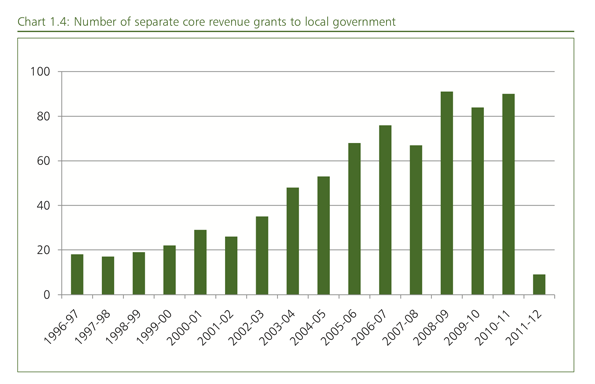
Mid-term Election Accelerates Federal Deconstruction
The mid-term election of 2010 has already been labeled a political earthquake. It was more like a shift of tectonic plates than a mere earthquake, and its results may be felt for decades. The landmark election signaled the beginning of deconstruction at the federal level in the United States. The Young Guns of the Republican Party (Representatives McCarthy, Cantor and Ryan) will lead a freshman class of 65 new members of Congress on a budget crusade to rein in government spending. Their first act will be to return federal spending to 2008 levels. There will be many acts to follow. These Congressmen will follow the lead of the “Deconstructors” who began deconstruction at the state level earlier this year.

Republican Governor Chris Christie was sworn into office in January of 2010 in a blue state election shocker. He wasted no time declaring a fiscal state of emergency. New Jersey had raised taxes 115 times in eight years and increased spending from $26 billion in 2001 to $45 billion when Christie took office. The state had a $10 billion deficit and had exhausted its borrowing capacity. Christie slammed on the brakes and froze $2.2 billion of spending. He refused to raise taxes. Christie tackled the Teachers unions, forced the Democratic legislature to impose pension reform, and even cancelled the $10 billion ARC tunnel between New Jersey and New York, the most costly public works project in the United States. Governor Christie has emerged as the first Deconstructor.
California’s inconsistent governor, Arnold “The Terminator” Schwarzenegger may be forced to become “The Deconstructanator” before he leaves office. Faced with a $19 billion deficit, Arnold was forced to furlough 200,000 government workers. His plan for three day a month furloughs, equivalent to a 14% pay cut, was upheld by California’s Supreme Court. Six labor unions and 37,000 workers settled with Arnold accepting pension reform over furloughs. Further Deconstruction is inevitable.
Newly elected Governor Brown will not have revenues from housing and dot.com bubbles to sustain the largess of his legislators. On October 23rd, the LA Times reported California shed 37,300 jobs in September. According to the state Employment Development Department, local government absorbed 32,400 of the job losses in September. The public employee layoffs are just beginning as cities and counties join the state in austerity measures. Where the private sector absorbed the brunt of the layoffs in 2008 and 2009, and Obama’s Stimulus bill insulated the public sector in 2010, the next wave will decimate the public employees of California.
With the mid-term election mandate, federal bail-outs are no longer a viable solution to balance state budgets. Dozens of states have projected budget shortfalls of more than $100 billion for Fiscal Year 2012. Joining California in the state fiscal train wreck category are Illinois, Michigan and New York. Illinois has a budget of $26 billion that is $13 billion in the red. Despite its huge deficit, Illinois legislators increased state spending by 15% this year based on wishful projections that revenues will increase by 17%. Michigan is not far behind with a $4 billion deficit and a budget that was only balanced with $1 billion from the federal government.
New York has a FY 2012 deficit of $13.5 billion. Its state government is dysfunctional and in denial. Newly elected Governor Cuomo has presented vague plans to solve New York’s misery. E.J. McMahon, executive director of the conservative Empire Center for New York State Policy said, “Cuomo’s budget proposals boil down to vague pledges of reducing costs and rooting out inefficiencies.” Cuomo is no Deconstructor and he will not be able to hide from New York’s fiscal reality. Where rationale fiscal management has long been ignored, Greek-like austerity measures and Deconstruction are inevitable.
Not All States are Mismanaged
Rhode Island was in dire straits last year with a $60 million deficit, declining revenues and unemployment at 12%. Governor Donald Carcieri realized the only way out of financial trouble was to make tough choices and embrace "fiscal responsibility." He trimmed the state workforce through layoffs, attrition and leaving jobs unfilled. A classic deconstructionist, he streamlined and combined offices and agencies. He raised the retirement age for state pensions, cut benefits, and negotiated better contracts with unions and health care providers.
Another Deconstructor is Governor McDonnell of Virginia. When McDonnell was swept into office with Governor Christie in 2010, Virginia had a $1.8 billion deficit. Virginia’s state budget had grown by 73.4% between 2000 and 2009, much faster than its population and inflation. Since taking office, Governor McDonnell converted the deficit into a $200 million surplus. He overhauled Virginia’s pension system saving $3 billion over 10 years. He imposed an immediate, statewide hiring freeze that covers all noncritical areas of state government. He cut and consolidated boards and agencies saving $20 million per year.
Deconstruction Goes Global
Global Deconstruction began in 2010 as a result of reduced worldwide government revenues caused by the prolonged Great Recession. No nation is exempt, including the US. Some like Germany have opted for fiscal discipline, helping to maintain Europe’s strongest economy. The Greeks ignored the crisis and rioted in response to the austerity plan imposed by the European Union. Yet despite their displeasure, austerity is an imposed reality Greek workers cannot avoid.
The French responded characteristically with paralyzing civil strikes in response to the Sarkozy government increasing the retirement age from 60 to 62. The French unions are adamantly opposed to any change to the pension system. Sarkozy said he would shore up the pension system with “new levies on France’s highest earners and on company profits”. (France 24 International News October 5, 2010)
In England, the response to the fiscal realities of the Great Recession have been draconian cuts which will cost 490,000 public sector jobs 2015. The cuts of $128 billion over 4 years made on “Axe Wednesday” represent 4.5% of their 2014-2015 GDP, equivalent to $650 billion in cuts to the US budget. (Chart 1.4 - SPENDING REVIEW 2010 Presented to Parliament by the Chancellor of the Exchequer by Command of Her Majesty October 2010). The BBC will see its funding cut by 360 million pounds, the budget of all its national radio services combined. Hundreds of London based diplomats will see their jobs disappear. Even the sacrosanct defense budget will receive cuts of 8%. (FT.com Daniel Pimlott October 20, 2010).

Deconstruction is not limited to Europe. In Russia, Nikolai Volgin, president of the National Assembly of Labour and Social Policy Specialists, said he anticipates widespread layoffs this year, with as many as 1.5 million more people losing their jobs. Russia already has 8 million unemployed. Volgin said, “I do not rule out that there may be 9 to 9.5 million jobless in the country.” If Volgin’s predictions are correct, Russia will see an unemployment rate of 12 to 12.7 percent in 2011.
Even Cuba has felt the chilling winds of deconstruction. President Raul Castro startled his people in August by stating 20% of Cuban workers may be redundant. He announced they will eliminate 500,000 state jobs in March of 2011 and allow some workers to work for themselves. Cubans are allowed to sell their own fruits and vegetables for the first time. The Cuban workforce is 5.1 million and 95% work for the state. Castro’s deconstruction will effect 10% of all Cuban workers.
The difficult deconstruction occuring both at home and abroad is just in its earliest stages. Those countries and regions that take the opportunity to reform themselves will be the ones who will emerge with greater prosperity after the Great Deconstruction.
Robert J Cristiano PhD is the Real Estate Professional in Residence at Chapman University in Orange, CA and Head of Real Estate for the international investment firm, L88 Investments LLC. He has been a successful real estate developer in Newport Beach California for twenty-nine years.
¬¬¬
Other works in The Great Deconstruction series for New Geography
Deconstruction: The Fate of America? – March 2010
The Great Deconstruction – First in a New Series - April 11, 2010
An Awakening: The Beginning of the Great Deconstruction – June 12, 2010
The Great Deconstruction :An American History Post 2010 – June 1, 2010
A Tsunami Approaches - Beginning of the Great Deconstruction - August 2010
The Tea Party and the Great Deconstruction – September 2010
The Great Deconstruction - Competing Visions of the Future – October 2010













The question is how much will states pick up.
A theme of the tea party is the feds are going way beyond what the constitution allows. They need to recognize that then the states can step in where politics allows and do the same thing. However this will greatly discomfort big business who much prefer federal standards than 51 standards. (All be it states can get together and set up standards if states with more than 60% of the population set the same standards it becomes a defacto national one).
Maybe, Maybe Not
Robert - you make a compelling case for the impending deconstruction and I am in agreement with you about the need for fiscal restraint. But I am not going to hold my breath. We've heard all of this before and if my memory serves me right the last conservatives who held the proverbial reins of power built a more massive government, increased spending and had no appetite for cuts of any kind. Some in the conservative leadership decry pork but are actually the kings of earmarks. So, the new insurgents will occupy their offices in January and face the same daily parade of outstretched hands looking for something from the government that their now defeated predecessors faced. I for one am going to be interested in seeing how this all gets sorted out in the coming months.